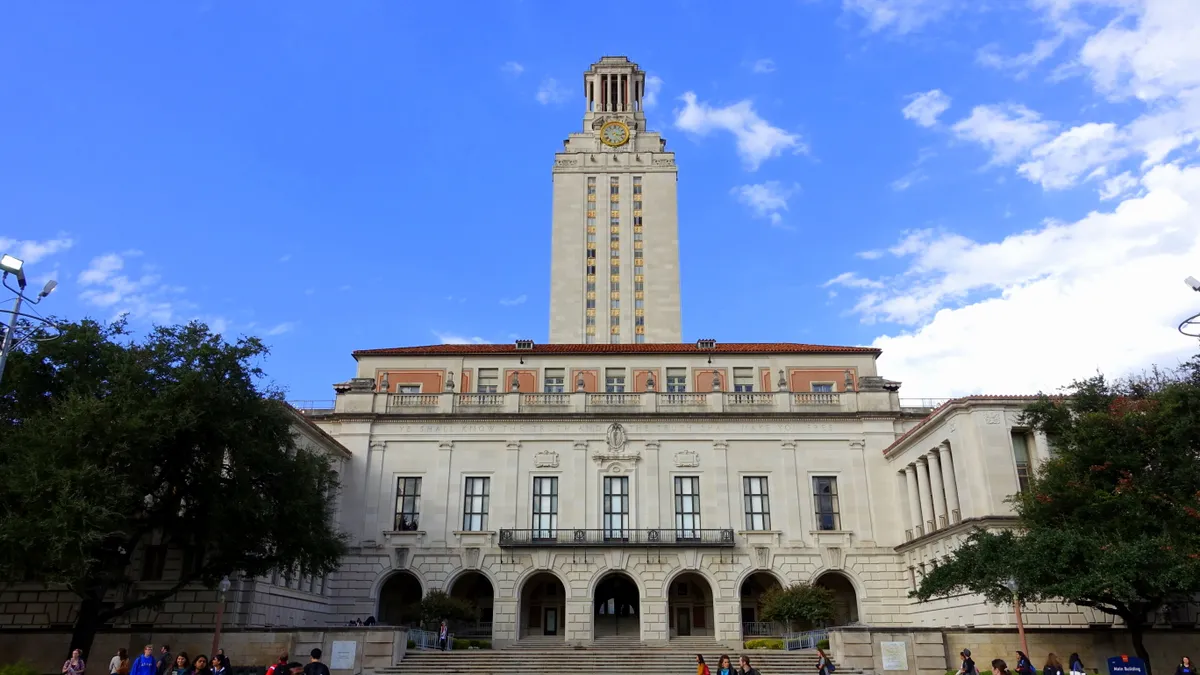Dive Brief:
- The Michael & Susan Dell Foundation will commit $100 million over a decade to provide financial aid and other support to low-income students at the University of Texas at Austin.
- Undergraduate students who are eligible for the Pell Grant will receive free laptops, as well as financial aid coaching and internship and career planning, among other services.
- Freshmen with the greatest need will also receive $20,000 to cover additional expenses, on top of in-state students having their tuition and fees fully paid. The campaign aims to boost the university's graduation rate among Pell-eligible students.
Dive Insight:
The University of Texas System's flagship institution has already made efforts to be more affordable for its low-income students. Last year, UT Austin announced that starting in the fall of 2020 it would offer free tuition to all in-state students whose families earned $65,000 or less a year in adjusted gross income, more than doubling the financial threshold to qualify for the program, the Texas Advance Commitment, which was previously $30,000.
The system's board of regents established a $160 million endowment for the free tuition program, NPR reported.
The expansion of the Dell Foundation's Dell Scholars initiative at UT Austin is also expected to begin in the fall of 2020. In a press release, the university said it is attempting to raise the six-year graduation rate among Pell-eligible students from 73% to 90%. Its overall graduation rate is about 86%, according to the university. (The most recently available federal data lists the university's six-year graduation rate at 83% for students who began their studies in the fall of 2012.)
Dell Scholars is a national program launched in 2004. It has helped more than 5,000 students, according to the program's website, which lists tutoring, financial support, and legal and mental health services among its offerings.
At UT Austin, all Pell-eligible students will receive myriad support services, including tutoring, peer advising and planning for graduation. But only the poorest students, those whose expected family contribution is less than $1,000, would get the $20,000, The Texas Tribune reported. Those funds could be applied to room and board, transportation, supplies and other costs of attendance.
The university said it will raise funding to maintain the services after the foundation money expires in 10 years.
About 23% of UT Austin's 51,684 undergraduates were Pell recipients in fall 2018, according to data from the Texas Higher Education Coordinating Board, which oversees higher education in the state.
Pell recipients have historically lagged their peers in college completion. Slightly fewer than half of Pell students nationwide who enroll in a four-year college go on to graduate, compared to 59% of all students, according to a 2018 report from Third Way, a left-leaning think tank. By its analysis, 214 institutions graduated Pell students at a rate of less than 25%
Texas has set aggressive goals for college completion.
The state's 60x30TX plan, introduced in 2015, aims for 60% of Texas adults between the ages of 25 and 34 to have earned a degree or certificate by 2030. Fewer than 44% of state residents in that age bracket had such a credential by 2017.











